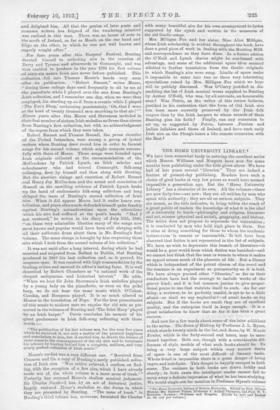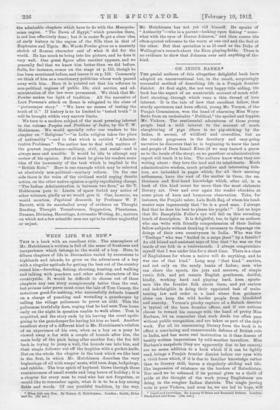THE HOME UNIVERSITY LIBRARY.*
WE have been somewhat tardy in noticing the excellent series which Messrs. Williams and Norgate have now for some months been publishing under the title given above. We have had. of late years several "libraries." They are indeed .a feature of present-day publishing. Readers have such a choice of good books at very low prices as would have seemed impossible a generation ago. But the "Home University Library" has a character of its own. All the volumes—there are now forty-two—are new : they are all written by men who speak with authority; they are all on serious subjects. They are meant, as the title indicates, to bring within the reach of a groat public of readers the knowledge of what it is the ideal of a university to teach—philosophy and religion, literature anchart, science (physical and social), geography, and history. The series does not propose to supersede the universities ; it is conducted by„men who hold high place in them. But it aims at doing something for those to whom the academic lecture-room' is remote or inaccessible. It 'will have been ()beetled that fiction is not represented in the list of •subjeots. We have no wish to depreciate this branch of literature—it would be a poor world from which .notion was banished—and we cannot but think that the man or women to whom it makes no appeal misses much of the pleasure of life. But a library which is independent of the potent charm of the novel and the romance is an experiment as praiseworthy as it is bold. We have always praised other "libraries," so •far as their conductors have had the courage to include works of the graver kind ; and it is but common justice to .give propor- tional praise to one that restricts itself to such. As for our delay, a reviewer, to be perfectly candid, is apt to be a Little afraid—or shall we say neglectful ?—of sMall books on big subjects. But if the books are small- they arc of excellent quality, and the enterprise iteelf is large enough. It is a great satisfaction to know that so far it has been a great success.
And now for a few words about some of the later additions to the series. The Dawn of History, by Professor J. L. Myres, which stands twenty-ninth in the list, and Borne; by W. Warde Fowler, which is the forty-second and latest, may be men- tioned together. Both are, though with a considerable dif- ference of style, models of what such books•should be. To bring a very large subject within very narrow limits of space is one of the most difficult of literary tasks. Where detail is impossible there is a great danger of being vague and indefinite. This danger is happily escaped in both cases. The outlines in both books are drawn boldly and clearly ; in both eases the intelligent reader cannot fail to carry away a definite impression of what he has been studying. We would single out for mention in Professor Myres'a volume ikeHam uni„„,„io, Library of Modern Knowledge. Edited by Prof. Gilbert Murray, 1Tr. Herbert Pisher, Professor J. Arthur Thomson. and Prof. w. Brewster. London Williams and Norgute. [Cloth le. not, and leather 2s. Od. not per volume.]
the admirable chapters which have to do with the Mesopota- mian region. "The Dawn of Egypt," which precedes them, is not less effectively done; but it is easier tio get a clear idea of early history in the region of the Nile than in that of Euphrates and Tigris. Mr. Warde Fowler gives us a masterly sketch of Roman character and of what it did for the world. He has much to bring into his picture, and he does it very well. One great figure after another appears, and we aenerally feel that we know him better than we did before. Sella, for instance, comes on the stage at p. 155, though he has been mentioned before, and leaves it on p. 159. Commonly we think of him as a reactionary politician whose work passed away with him. Here it is pointed out that his reforms in non-political regions of public life, civil service, and ad-
ministration of the law were permanent. We think that Mr. Fowler makes too light of tradition. All the narrative of Lars Porsena's attack on Rome is relegated to the class of "picturesque story." "We have no means of testing the truth of it." If history is to be limited to "tested truth" it will be brought within very narrow limits.
We turn to a modern subject of the most pressing interest in the volume Peoples and Problems of India, by Sir T. W. HoIderriess. We would specially refer our readers to the chapter on "Religions "—" in India religion takes the place of nationality "—and to that which is entitled "Adminis- trative Problems." The author has to deal with matters of the gravest importance—military, civil, and social—and is always sane and sensible. It would be idle to attempt any review of his opinion. But at least he gives his readers some idea Of the immensity of the task which is implied in the "British Rule." Here is one example which may be selected as absolutely non-political—sanitary reform. On the one side there is the voice of the civilized world urging drastic action, on the other native opinion angrily repudiating change. "The Indian Administration is between two fires," as Sir T. Holderness puts it. Limits of space forbid any notice of other volumes, gladly as we would give it. One, however, we would mention, Psychical Research, by Professor W. F. Barrett, with its marshalled array of evidence on Thought Reading, Thought Transference, Suggestion, Phantasms, Dreams, Divining, Hauntings, Automatic Writing, Szc., matters on which not a few scientific men are apt to be either neglectful or unjust.











































 Previous page
Previous page